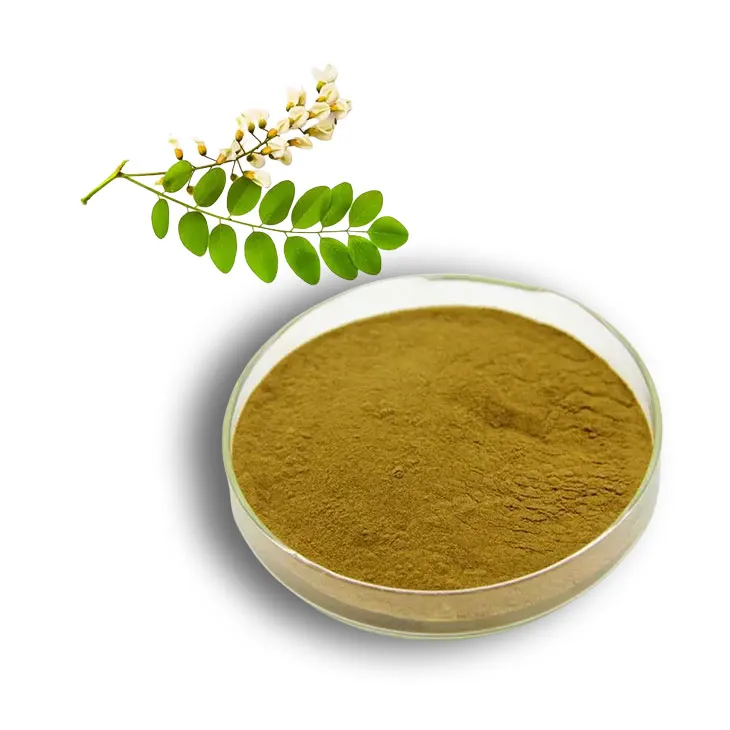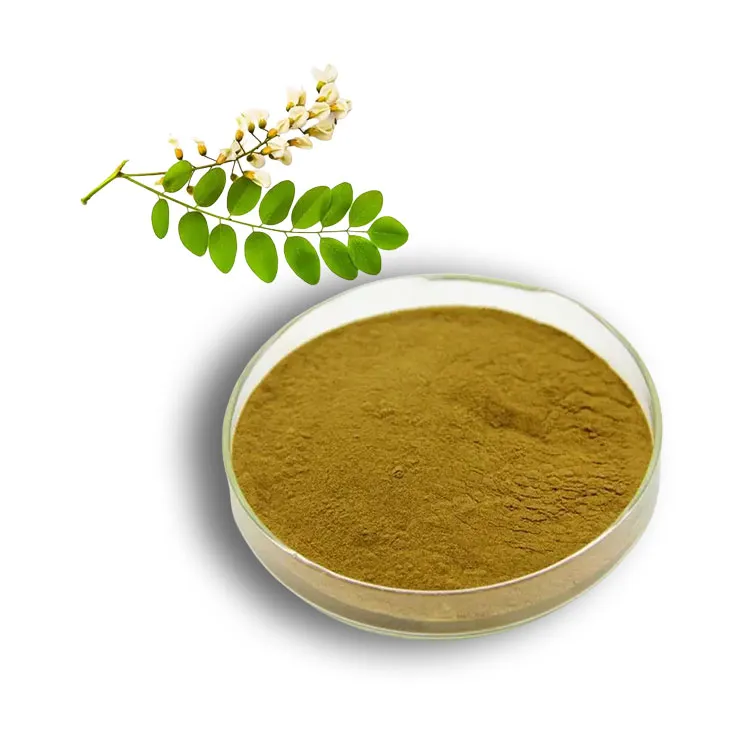- 0086-571-85302990
- sales@greenskybio.com
Active components in sophora japonica flower extract.
2024-11-26

1. Introduction
The Sophora Japonica Flower Extract has been a subject of great interest in recent years due to its numerous active components with various valuable properties. These components have the potential to be used in different fields such as medicine, nutrition, and the development of functional products.

2. Saponins in Sophora Japonica Flower Extract
Saponins are among the most important active ingredients in Sophora Japonica Flower Extract. In vitro studies have demonstrated their significant cytotoxic activities against some cancer cells.
2.1. Cancer - related research potential
The cytotoxic effect of saponins on cancer cells holds great promise for cancer research. For example, they may interfere with the growth and proliferation of cancer cells by targeting specific cellular mechanisms. However, more in - vivo studies are needed to fully understand their potential in cancer treatment.
2.2. Mechanisms of action
Saponins might act through multiple mechanisms. One possible way is by disrupting the cell membrane integrity of cancer cells. This disruption can lead to the leakage of intracellular components and ultimately cell death. Another mechanism could be related to their interference with cell signaling pathways that are crucial for cancer cell survival and growth.

3. Alkaloids in the extract
Alkaloids also play a crucial role in Sophora japonica flower extract. They have shown potential in the regulation of the nervous system.
3.1. Nervous system regulation
The alkaloids may have a regulatory effect on the nervous system. For instance, they could potentially modulate neurotransmitter levels or receptor functions. This makes them candidates for the treatment of certain neurological disorders. Some alkaloids might have an inhibitory effect on over - excited neurons, which could be beneficial in conditions such as epilepsy.
3.2. Future research directions
However, more research is required to fully elucidate the exact mechanisms of how these alkaloids affect the nervous system. Scientists need to conduct more in - depth studies on the pharmacokinetics and pharmacodynamics of these alkaloids in the context of neurological disorders.

4. Vitamins and minerals in the extract
The presence of vitamins and minerals in the Sophora japonica flower extract enriches its nutritional value significantly.
4.1. Nutritional significance
Vitamins are essential for various physiological functions in the human body. For example, certain vitamins in the extract may contribute to maintaining healthy skin, eyesight, and immune function. Minerals, on the other hand, are involved in processes such as bone formation, muscle contraction, and nerve conduction.
4.2. Application in functional foods and dietary supplements
Given their nutritional value, the extract can be used in the development of functional foods and dietary supplements. Functional foods containing Sophora japonica flower extract could provide additional health benefits beyond basic nutrition. Dietary supplements with this extract may be beneficial for individuals who have specific nutritional deficiencies or those who are looking to enhance their overall well - being.
5. Other active components
Besides saponins, alkaloids, vitamins, and minerals, the Sophora japonica flower extract may also contain other active components.
5.1. Flavonoids
Flavonoids are a class of polyphenolic compounds that are widely distributed in plants. In Sophora japonica flower extract, flavonoids may have antioxidant properties. Antioxidants are important as they can protect cells from oxidative damage caused by free radicals. Oxidative damage has been associated with various diseases such as cancer, cardiovascular diseases, and neurodegenerative disorders.
5.2. Phenolic acids
Phenolic acids are another group of compounds present in the extract. They may also contribute to the antioxidant activity of the extract. Additionally, phenolic acids could have anti - inflammatory properties. Inflammation is a key factor in many chronic diseases, and substances with anti - inflammatory properties may help in the prevention and treatment of such diseases.
6. Extraction and purification methods
To obtain the active components from Sophora japonica flowers, appropriate extraction and purification methods are required.
6.1. Traditional extraction methods
Traditional extraction methods include solvent extraction. Solvents such as ethanol or methanol are commonly used to extract the active components from the plant material. However, these methods may have some limitations, such as the potential for solvent residues in the final extract.
6.2. Modern extraction techniques
Modern extraction techniques offer more advantages. For example, supercritical fluid extraction (SFE) using carbon dioxide as the supercritical fluid can provide a more efficient and cleaner extraction process. It can also result in a higher - quality extract with less contamination.
6.3. Purification methods
After extraction, purification methods are needed to isolate the individual active components. Chromatography techniques, such as high - performance liquid chromatography (HPLC), are commonly used for purification. These techniques can separate different components based on their chemical properties, allowing for the isolation of pure active compounds.
7. Safety and toxicity considerations
When considering the use of Sophora japonica flower extract and its active components, safety and toxicity aspects need to be carefully evaluated.
7.1. Toxicity of individual components
Some of the active components, such as certain alkaloids, may have potential toxicity at high doses. It is important to determine the safe dosage range for each component to avoid adverse effects. Animal studies are often carried out to assess the toxicity of these components.
7.2. Allergic reactions
There may also be a risk of allergic reactions in some individuals. Allergens in the extract could cause skin rashes, itching, or more severe allergic responses in sensitive individuals. Therefore, proper safety testing should be conducted before widespread use.
8. Conclusion
In conclusion, the Sophora japonica flower extract contains a rich variety of active components including saponins, alkaloids, vitamins, minerals, flavonoids, and phenolic acids. These components have diverse properties and potential applications in cancer research, nervous system regulation, the development of functional foods and dietary supplements, and the prevention and treatment of various diseases. However, more research is needed to fully understand their mechanisms of action, optimize extraction and purification methods, and ensure their safety. With further investigation, the Sophora japonica flower extract has the potential to become a valuable resource in the fields of medicine and nutrition.
FAQ:
What are the main active components in sophora japonica flower extract?
The main active components in sophora japonica flower extract include saponins, alkaloids, vitamins and minerals.
What is the significance of saponins in sophora japonica flower extract?
Saponins in sophora japonica flower extract have shown cytotoxic activities against some cancer cells in vitro studies, which indicates their potential applications in cancer research.
How do alkaloids in sophora japonica flower extract function?
Alkaloids in the extract may have a regulatory effect on the nervous system and potentially can be used in the treatment of certain neurological disorders.
What is the role of vitamins and minerals in sophora japonica flower extract?
The presence of vitamins and minerals in the sophora japonica flower extract enriches its nutritional value, which can be used in the development of functional foods and dietary supplements.
What are the potential applications of sophora japonica flower extract?
Due to its active components such as saponins with potential anti - cancer properties, alkaloids with possible effects on the nervous system, and vitamins and minerals with nutritional value, sophora japonica flower extract can potentially be used in cancer research, treatment of neurological disorders, and development of functional foods and dietary supplements.
Related literature
- Active Components and Biological Activities of Sophora japonica Flower Extract"
- "Analysis of the Active Compounds in Sophora japonica Flower and Their Pharmacological Effects"
- ▶ Hesperidin
- ▶ Citrus Bioflavonoids
- ▶ Plant Extract
- ▶ lycopene
- ▶ Diosmin
- ▶ Grape seed extract
- ▶ Sea buckthorn Juice Powder
- ▶ Fruit Juice Powder
- ▶ Hops Extract
- ▶ Artichoke Extract
- ▶ Mushroom extract
- ▶ Astaxanthin
- ▶ Green Tea Extract
- ▶ Curcumin
- ▶ Horse Chestnut Extract
- ▶ Other Product
- ▶ Boswellia Serrata Extract
- ▶ Resveratrol
- ▶ Marigold Extract
- ▶ Grape Leaf Extract
- ▶ New Product
- ▶ Aminolevulinic acid
- ▶ Cranberry Extract
- ▶ Red Yeast Rice
- ▶ Red Wine Extract
-
Diosmin
2024-11-26
-
Citrus Aurantium Extract
2024-11-26
-
Cocoa Extract
2024-11-26
-
Cactus Extract
2024-11-26
-
Chaste Berry Extract
2024-11-26
-
Propolis Extract Powder
2024-11-26
-
Peppermint Extract Powder
2024-11-26
-
Lemon Juice Powder
2024-11-26
-
Okra Extract
2024-11-26
-
Saw Palmetto Extract
2024-11-26





















